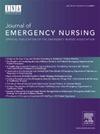Family Experience in Making the Decision to Be Present With the Child During Invasive Procedures and/or Cardiopulmonary Resuscitation: A Qualitative Systematic Review
IF 2.3
4区 医学
Q2 EMERGENCY MEDICINE
引用次数: 0
Abstract
Introduction
Family presence during invasive procedures and cardiopulmonary resuscitation has been studied, emphasizing the benefits for children, families, and the health care team. Therefore, there are several aspects that need deeper understanding such as values, beliefs, long-term effects, and relevant information for the family’s decision-making process. The aim was to understand the family’s decision-making process regarding whether or not to be present with the child during invasive procedures and cardiopulmonary resuscitation in the neonatal and pediatric inpatient and emergency departments.
Methods
A qualitative systematic review was conducted according to the JBI evidence synthesis manual. The databases MEDLINE, CINAHL, Embase, PsycINFO, Web of Science Core Collection, LILACS, and Scopus were searched. Studies were grouped using the JBI meta-aggregation method. The emerging themes were reviewed using the ConQual approach to establish confidence in the results.
Results
Ten studies were included in the review. Data analysis revealed 5 synthesized findings: vulnerability, choice, beliefs, family’s needs to support their decision, and resolution, which shows the family’s preference to be with or not with the child at all times and in all circumstances, motivated by their desire to care for the child and fulfill their moral duty.
Discussion
The family’s decision-making process is characterized by a commitment to the child’s well-being, taking into account the family’s moral obligation to care for the child in all circumstances. Institutional policies ought to encompass provisions for family presence during cardiopulmonary resuscitation and invasive procedures, thereby ensuring the preservation of family autonomy in decision making.
在有创手术和/或心肺复苏过程中决定陪伴孩子的家庭经验:一项定性的系统回顾。
简介:有创手术和心肺复苏期间的家庭存在已被研究,强调对儿童,家庭和卫生保健团队的好处。因此,有几个方面需要深入了解,如价值观,信仰,长期影响,以及家庭决策过程的相关信息。目的是了解在新生儿、儿科住院和急诊科进行有创手术和心肺复苏时,家庭是否与孩子在一起的决策过程。方法:根据JBI证据合成手册进行定性系统评价。检索MEDLINE、CINAHL、Embase、PsycINFO、Web of Science Core Collection、LILACS、Scopus等数据库。采用JBI meta-aggregation方法对研究进行分组。使用征服方法对新出现的主题进行了审查,以建立对结果的信心。结果:纳入10项研究。数据分析显示了5个综合结果:脆弱性、选择、信念、家庭支持其决定的需求和决心,这表明家庭在任何时候、任何情况下都倾向于与孩子在一起或不与孩子在一起,这是出于他们关心孩子和履行道德责任的愿望。讨论:家庭决策过程的特点是对儿童福祉的承诺,同时考虑到家庭在任何情况下照顾儿童的道德义务。体制政策应包括在心肺复苏和侵入性手术期间家属在场的规定,从而确保在决策中保留家庭自主权。
本文章由计算机程序翻译,如有差异,请以英文原文为准。
求助全文
约1分钟内获得全文
求助全文
来源期刊
CiteScore
3.10
自引率
11.80%
发文量
132
审稿时长
46 days
期刊介绍:
The Journal of Emergency Nursing, the official journal of the Emergency Nurses Association (ENA), is committed to the dissemination of high quality, peer-reviewed manuscripts relevant to all areas of emergency nursing practice across the lifespan. Journal content includes clinical topics, integrative or systematic literature reviews, research, and practice improvement initiatives that provide emergency nurses globally with implications for translation of new knowledge into practice.
The Journal also includes focused sections such as case studies, pharmacology/toxicology, injury prevention, trauma, triage, quality and safety, pediatrics and geriatrics.
The Journal aims to mirror the goal of ENA to promote: community, governance and leadership, knowledge, quality and safety, and advocacy.

 求助内容:
求助内容: 应助结果提醒方式:
应助结果提醒方式:


